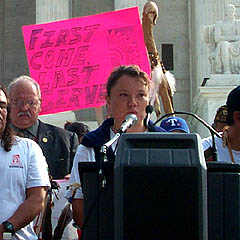FROM THE ARCHIVE
Tribes press U.S. to honor sacred obligations
Facebook
Twitter
Email
TUESDAY, OCTOBER 8, 2002
 SOVEREIGNTY RUN: Senate Majority Leader Tom Daschle (D-S.D.) and Quinault Nation President Pearl Capoeman-Baller march to U.S. Supreme Court. Photo © NSM.  Quinault Nation member and run leader Fawn Sharp. |
Sovereignty Run - http://www.sovrun.org
Sovereignty Protection Initiative - http://www.ncai.org/main/pages/issues/governance/
supreme_court.asp Related Stories:
Sovereignty Run ends at Supreme Court (10/7)
Supreme Court beginning new term (10/1)
Historic sovereignty run starts today (9/11)
'It's going to change Indian Country' (8/14)
Tribes seek to overturn Supreme Court (2/27)
Inouye challenges tribes on sovereignty (2/26)
Advertisement
Stay Connected
Contact
Search
Trending in News
1 White House Council on Native American Affairs meets quick demise under Donald Trump
2 'A process of reconnecting': Young Lakota actor finds ways to stay tied to tribal culture
3 Jenni Monet: Bureau of Indian Affairs officer on leave after fatal shooting of Brandon Laducer
4 'A disgraceful insult': Joe Biden campaign calls out Navajo leader for Republican speech
5 Kaiser Health News: Sisters from Navajo Nation died after helping coronavirus patients
2 'A process of reconnecting': Young Lakota actor finds ways to stay tied to tribal culture
3 Jenni Monet: Bureau of Indian Affairs officer on leave after fatal shooting of Brandon Laducer
4 'A disgraceful insult': Joe Biden campaign calls out Navajo leader for Republican speech
5 Kaiser Health News: Sisters from Navajo Nation died after helping coronavirus patients
News Archive
About This Page
You are enjoying stories from the Indianz.Com Archive, a collection dating back to 2000. Some outgoing links may no longer work due to age.
All stories are available for publishing via Creative Commons License: Attribution-NonCommercial-NoDerivatives 4.0 International (CC BY-NC-ND 4.0)
